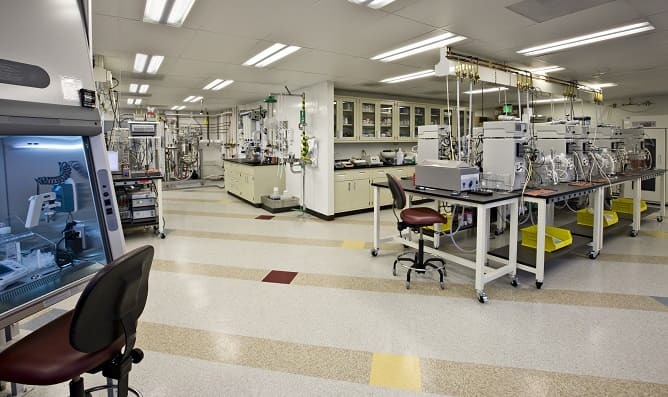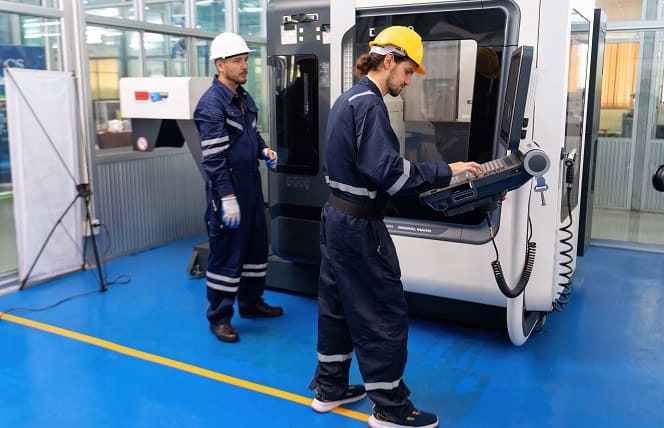
 Data Structure
Data Structure Networking
Networking RDBMS
RDBMS Operating System
Operating System Java
Java MS Excel
MS Excel iOS
iOS HTML
HTML CSS
CSS Android
Android Python
Python C Programming
C Programming C++
C++ C#
C# MongoDB
MongoDB MySQL
MySQL Javascript
Javascript PHP
PHP
- Selected Reading
- UPSC IAS Exams Notes
- Developer's Best Practices
- Questions and Answers
- Effective Resume Writing
- HR Interview Questions
- Computer Glossary
- Who is Who
What is the full form of CNC?
Introduction
Computerised Numerical Control (CNC) is a form of automation in manufacturing that uses computer programs to control the movement and operation of machinery. These machines are capable of precise and complex operations allowing for high levels of accuracy, repeatability and efficiency.

These systems consist if three main components: the CNC controller, which is a computer that runs software to generate machine tool commands; the machine tool which is the physical equipment that performs the machining operations; and the part program which is a set of instructions written in a specific programming language that tells the CNC controller how to move the machine tool to perform a specific operation on a work piece.
Working of CNC machines
CNC machines work by using computer programs to control the movement and operation of machine tools via the following steps
Design and Programming Here the part to be designed is created using Computer- Aided Design (CAD) and computer-aided manufacturing (CAM) software. This program consists of a set of instructions that specify the machining operations, tool paths and other parameters
Set-up and Tooling The material to be machines is mounted on a worktable and the appropriate cutting tools are installed. It is then set up according to the program, which includes inputting the program into the CNC controller, setting the workpiece and other parameters.
Execution Once the CNC machine is set up, part of the program is executed. The CNC controller reads instructions from the part program and sends commands to the machine tool to cut along the specified paths.
Monitoring and Adjustment If needed, adjustments can be made to cutting parameters and tools to optimise the process and get the desired results.
Completion and Inspection After the machining process is completed the workpiece is inspected for quality and accuracy.
Repeatable Production Once the part program is created and the CNC machine is set up, the same program can be used to produce multiple parts with consistent quality, making CNC machines ideal for high-volume production.
Advantages of CNC over Manual Machines:
Some of the key advantages of CNC machines are
Precision CNC machines are capable of extremely precise and accurate machining operations. They can consistently achieve tight tolerances and fine surface finishes, which may be challenging or impossible to achieve with manual machines which are prone to human errors.
Automation and Productivity CNC machines are fully automated and can run for extended periods of time without human intervention. They can perform repetitive tasks with high accuracy and speed, leading to increased productivity and reduced labour costs.
Flexibility and Versatility CNC machines can be easily reprogrammed to perform different machining operations, making them highly versatile.
Complex and Intricate Operations CNC machines are capable of performing complex machining operations that may be impractical or impossible to achieve with manual machines.
Reduced Scrap and Waste CNC machines can optimise cutting parameters, tool paths, and other machining parameters to minimise scrap and waste material. They can also automatically detect and compensate for tool wear, reducing the likelihood of producing defective parts
Data Logging and Traceability CNC machines can log data such as cutting parameters, tool usage, and machine performance, which can be used for process monitoring, analysis, and traceability.
Operator Safety CNC machines are designed with safety features, such as protective enclosures, emergency stop buttons, and interlocks, to ensure operator safety during operation.
Applications of CNC in various industries
Some of the common industries that utilise CNC machines include
Aerospace CNC machines are used in the aerospace industry for manufacturing complex components such as aircraft parts, engine components, and structural elements.
Automotive CNC machines are extensively used in the automotive industry for manufacturing parts such as engine blocks, cylinder heads, transmission components, and chassis components.
Electronics CNC machines are used in the electronics industry for manufacturing printed circuit boards (PCBs), connectors, and other electronic components.
Medical CNC machines are used in the medical industry for manufacturing medical devices such as orthopaedic implants, surgical instruments, and dental prosthetics.

Energy CNC machines are used in the energy industry for manufacturing components used in renewable energy systems, oil and gas equipment, and power generation equipment.
Defence CNC machines are used in the defence industry for manufacturing components such as firearms, munitions, and military vehicles. CNC machines enable the production of precise and durable parts used in defence equipment, meeting the stringent requirements of the defence industry.
Furniture and Woodworking CNC machines are used in the furniture and woodworking industry for manufacturing furniture components, cabinetry, and custom woodwork.
Jewellery CNC machines are used in the jewellery industry for manufacturing intricate and detailed jewellery pieces.
FAQs
What is Computerised Numerical Control?
Ans: Computerised Numerical Control (CNC) is a technology that uses computers to control machine tools and other automated systems for manufacturing and fabrication processes.
How does Computerised Numerical Control work?
Ans: Computerised Numerical Control (CNC) systems work by using computer-based instructions to control the movement and operation of machine tools for manufacturing and fabrication processes.
How is CNC revolutionising the modern world?
Ans: CNC technology has transformed the modern world by revolutionising manufacturing and fabrication processes, enabling precision, automation, efficiency, flexibility, innovation, and sustainability in various industries.

